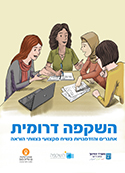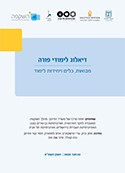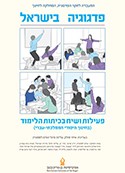Connecting between Education Research and Practice
The Center's Fields of Activities
Research and development (R&D) partnerships with strategic partners in the education field. The R&D partnerships seek to tackle challenges in the field of education by combining research aimed at obtaining in-depth understanding with the development of tools and resources for teaching and learning to deal with each challenge.
| 1
|
| Support to research and development (R&D) communities of education practitioners. Providing support and guidance to the communities as they carry out inquiry into their processes and practices to lead to improvements. The guidance and facilitation provided to the R&D communities support them in developing research skills, and provide the, with tools for systematic inquiry and for gathering and organizing relevant scientific knowledge. | 2
|
| Development of professional knowledge and its assimilation in practical learning tools and resources in collaboration with professional training and development bodies. We turn research-based knowledge into useful practical knowledge by developing tools and learning aids, testing their practical application, and making the necessary adjustments. | 3
|
| Advancing the understanding of processes of integration and consumption of professional pedagogical knowledge. We deal in research that is focused on obtaining and understanding knowledge and developing skills in our core practice areas. We study the interrelationship between scientific knowledge and professional knowledge and ways to strengthen them as well as forge academic-practice partnerships: opportunities, challenges, and effectiveness. | 4 |
The Center's activity is premised on the connection between high-quality academic research and collaborative development processes with education practitioners, together with the infrastructure to support the research and development processes in the R&D partnerships and professional communities. We combine research knowledge with applied practical knowledge and integrate research knowledge into pedagogical and practical tools.
The Research and Development Process
1. In collaboration: The Center, the intermediary bodies and the practitioners in the field are partners from start to finish in characterizing the problem, defining the goals, as well as developing, testing, and adapting applied tools.
2. Spawns from a need that comes from the practice; not from our research agenda, e.g. an intermediary body wishing to work on a certain problem or a principal seeking to improve a certain process at the school.
3. Based on local practical knowledge and the experience of professionals coupled with scientific knowledge based on systematic research.
4. The tools and learning products are connected to the local context and practices in the field alongside the knowledge gained in applied research. They are developed from the practical challenges and opportunities that arise from the pedagogical practice.
The Center has a large research team leading the research processes in the various arenas. The Center brings together senior scholars from a wide range of disciplines. The Center also has a team working to create meaningful research-practice connections to advance the relevance of the research and its products to practice. Many of the team members have teaching, administrative, and/or training experience.
The Center operates based on the eight years of research activity conducted by the Laboratory for the Study of Pedagogy (led by Dr. Danna Vedder-Weiss and Prof. Adam Lefstein), which included research and development work with partners in the field of education, including two education districts and professional development bodies. Researchers, district representatives, R&D representatives from the Ministry of Education, instructors, mentors and teachers were all involved in the research and development processes.
Research and development projects at the Laboratory for the Study of Pedagogy:
 
| Developing pedagogical discourse and leadership in Hashkafa - a national movement for teacher leadership
Guidance and support for over 160 teacher learning communities in two Ministry of Education districts. During this process, the lab team investigated aspects of pedagogical discourse and leadership and the development of practical tools to promote productive pedagogical discourse in professional learning communities.
See, for example, the following link for the tool booklet for leading teachers: https://in.bgu.ac.il/humsos/pedagogy/DocLib1/hashkafa-tools-2.pdf |
 
| Meaningful learning through academically productive dialogue
Promoting dialogical pedagogy in the classroom in language classes through the development of tools and learning resources and guiding teachers in their professional development. During the program, instructors, language teachers, and researchers (a partnership between Ben Gurion University, the Hebrew University and Tel Aviv University) developed study units based on dialogical principles. Among other aspects, the process was based on studies in the dialogical pedagogy field and the experience of instructors and teachers in the study units and with learning resources as well as an investigation of their teaching methods in the classroom and dilemmas that come up while teaching. See the tool booklet below: https://tinyurl.com/y5t7tzs3 |
 
| Pedagogy in Israel: Classroom Discourse Activity
The project focused on an analysis of learning and teaching practices in language classes as well as understanding teachers' perceptions of these practices in language classes in elementary schools in the Hebrew State education system. A comprehensive overview of the reality in the classrooms emerged from the study findings: The way the lessons are taught, in-class processes, the content taught, the questions the teachers ask, the assignments the students cope with, and the structure of participation in the discourse. The research findings and its implications were presented and discussed in dozens of groups of teachers, administrators, supervisors and pedagogical policymakers in Israel. See the following link for a detailed report: https://tinyurl.com/ut236hrp |